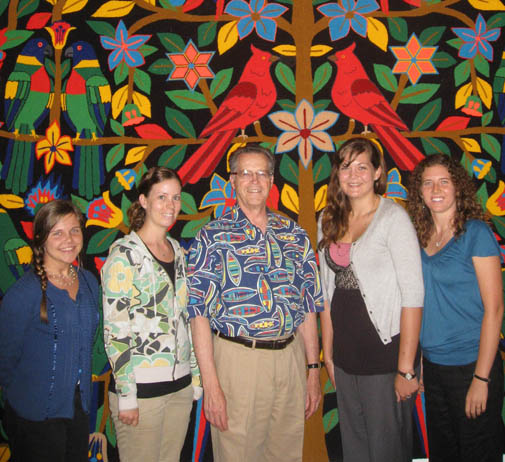Westmont Celebrates 20 Years of Education Program in Costa Rica
By
Westmont

Four Westmont students hoping to become teachers completed their final semester last month, six weeks after other graduating seniors picked up their diplomas at Commencement. The students, liberal studies graduates Courtney Ochs, Deborah Pope, Sage Johnson and English major Heather Cochran, took part in Westmont’s Costa Rica program. For two decades, Westmont has been involved with Lincoln School, an international, bilingual school in Costa Rica, where students hone their teaching skills at one of the top schools in Central America.
Spanish is the first language for 90 percent of the school’s 1,400 students. Gayle Tucker, Westmont professor of education, says the student teachers live with host families and are completely immersed in the language and culture.
“The demographics have changed rapidly in California’s K-12 schools,” Tucker says. “This program gives Westmont students an option to not just teach in a classroom where there are several Spanish speakers, but to live and work in a cross-cultural environment while they’re doing their student teaching.”
Ruth Tucker, professor of education and wife of Gayle, says it’s a unique and fantastic program. Her two daughters participated when they were college students.
“It’s a life-changing experience for them; when they return, they all say they would do it again,” Ruth says. “They have to grade students, communicate with parents and confront many cultural obstacles.”
Johnson, who had studied Spanish since the sixth grade and wanted to live in a Latin American country for an extended period of time, says she enrolled at Westmont in part because of the Costa Rica program.
“I remember getting off the plane and realizing I had to put some Spanish to practice to ask where to get my bags,” Johnson says. “I've also been in continual awe of the incredible and diverse beauty in Costa Rica, in jungles, beaches, rivers and people.”
Pope, who traveled to Costa Rica last year with the Westmont Choir tour, says having the experience of working at an international school gives her an advantage in obtaining a job teaching here or abroad.
"Every teacher at Lincoln School is teaching a class full of English language learners (ELL), which means that teachers have to put extra effort into planning lessons that facilitate their level of understanding and communication in a second language,” Pope says. “This provides excellent training for those of us who want to teach in California since we have lots of ELL students from different backgrounds that need specific attention and additional planning."
Ochs, who has kept a detailed blog of her travels to several cities in Costa Rica, Panama and Nicaragua during her student teaching semester, says working at Lincoln has given her many opportunities to use different materials and resources that aren’t available in most public schools in the U.S.
“I take my students to the science lab once a week for hands-on experiments and activities,” she says. “This is an incredible benefit, especially as most programs like this are being cut in California due to lack of money. We also have several technological resources such as SMART boards, laptops, and video conferencing capabilities.”
One thing the student teachers say they didn’t expect was to become so attached to their students and their host family.
“When Heather and I first walked into our host family’s house, Rosa, our host mother, said, “Mi casa es su casa,” Pope says. “I truly feel like it’s my home away from home, and I’m now a part of their family. I've been blessed by their kindness, love and generosity. I can now say I have family in Costa Rica.”
Filed under
Academics, Campus News